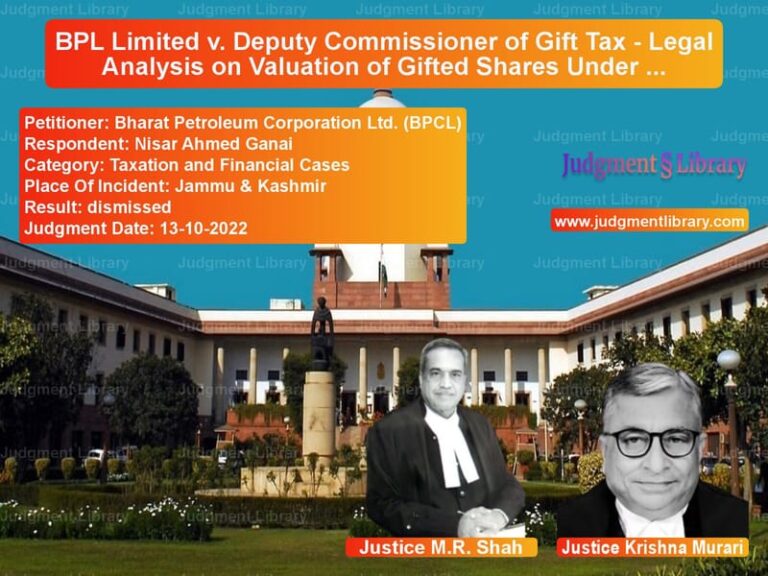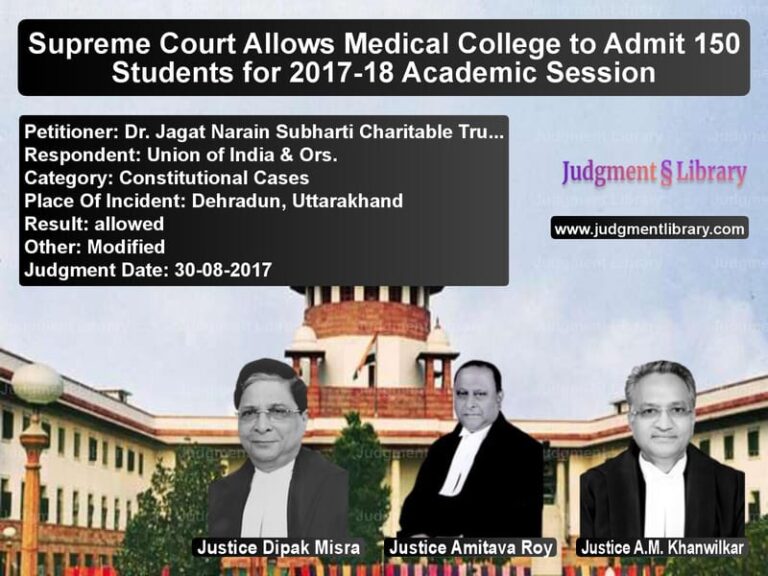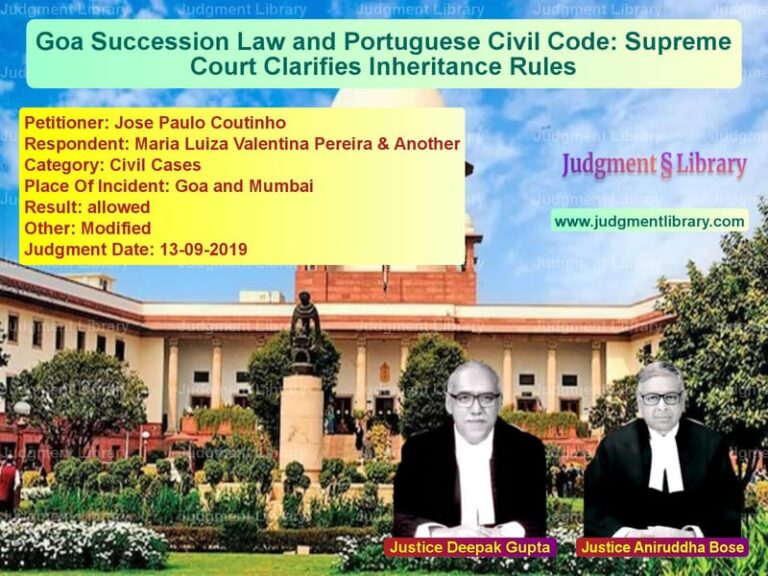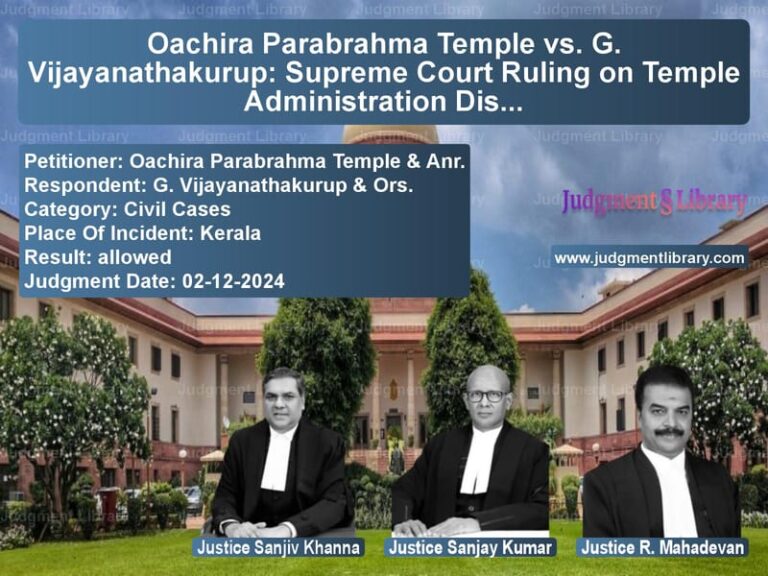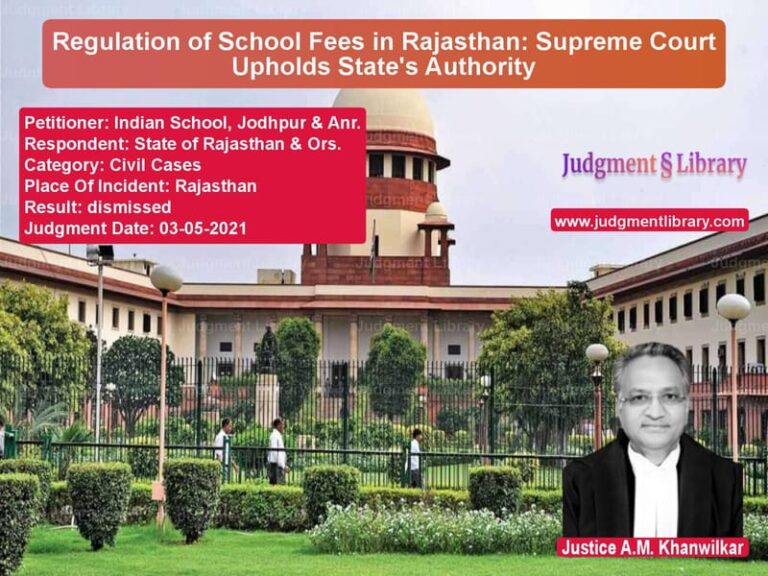Supreme Court Upholds Telangana High Court’s Decision in Property Dispute Case
The Supreme Court of India, in the case of Aruna Dhanyakumar Doshi v. The State of Telangana & Ors., upheld the Telangana High Court’s decision to quash criminal proceedings against two respondents in a long-standing family property dispute. The case, which centered on allegations of coercion in executing gift deeds, involved complex legal issues surrounding property rights, elder abuse, and criminal allegations.
Background of the Case
The appellant, Aruna Dhanyakumar Doshi, had filed a complaint that led to the registration of FIR No. 21 of 2021 against her son, daughter-in-law, granddaughter, and her daughter-in-law’s father. The complaint alleged offenses under various sections of the Indian Penal Code (IPC) and the Maintenance and Welfare of Parents and Senior Citizens Act, 2007. The case stemmed from a series of gift deeds executed in favor of the appellant’s family members, which she later sought to challenge.
Legal Issues Considered
- Whether the allegations against the fourth and fifth respondents (the granddaughter and her maternal grandfather) were specific and justified under criminal law.
- Whether the High Court was correct in quashing the FIR against these two respondents under Section 482 of the CrPC.
- Whether the appellant’s claims of coercion and undue influence in executing the gift deeds held legal merit.
Arguments of the Appellant (Aruna Dhanyakumar Doshi)
- The appellant alleged that she and her late husband had been pressured into executing the gift deeds under duress.
- She claimed that her son and daughter-in-law subjected her to mental and physical abuse, forcing her to transfer valuable properties.
- She relied on a letter written by her late husband on March 29, 2019, addressed to the District Magistrate, in which he stated that the gift deeds were executed under coercion and sought their cancellation.
- She further claimed that the fourth and fifth respondents were complicit in the alleged coercion and unduly benefited from the transfers.
Arguments of the Respondents (Family Members)
- The respondents contended that the gift deeds were executed voluntarily and that the appellant’s claims were fabricated.
- The fourth and fifth respondents (granddaughter and her maternal grandfather) argued that they had no role in the execution of the gift deeds and were being falsely implicated.
- The High Court found that there was no specific role attributed to these two respondents and, therefore, quashed the proceedings against them.
Supreme Court’s Observations
On the Validity of the Gift Deeds
The Court noted that:
- The first gift deed was executed on September 4, 2017, followed by a rectification deed on October 16, 2017, and another gift deed on November 7, 2017.
- The letter from the appellant’s husband, which surfaced much later in 2019, raised concerns but did not establish conclusive proof of coercion.
- The allegations were made over two years after the execution of the deeds, which weakened the appellant’s claims.
On the Allegations Against the Fourth and Fifth Respondents
The Supreme Court found that:
- There was no direct evidence or specific role attributed to the fourth and fifth respondents in coercing the appellant.
- The complaints made by the appellant and her daughter contained only general allegations, without any substantive proof.
- The fourth respondent (granddaughter) had been living in the UK at the time, further weakening the claim of her involvement.
On the High Court’s Decision to Quash the FIR
The Supreme Court upheld the Telangana High Court’s decision, ruling that:
- The allegations did not meet the threshold required to sustain criminal proceedings against the fourth and fifth respondents.
- The High Court’s use of Section 482 of the CrPC to quash the proceedings was justified.
- The appellant’s remaining claims against the second and third respondents (son and daughter-in-law) could proceed as per law.
Final Judgment
The Supreme Court dismissed the appellant’s plea and upheld the quashing of criminal proceedings against the fourth and fifth respondents. The Court ruled:
“The power to quash an FIR should be exercised sparingly and only in cases where the allegations do not establish a prima facie case. The High Court correctly applied this principle.”
Implications of the Judgment
- Reaffirms that general allegations without specific evidence cannot sustain criminal proceedings.
- Ensures that senior citizens’ rights under the Maintenance and Welfare of Parents and Senior Citizens Act, 2007, are not misused to settle personal disputes.
- Clarifies the role of Section 482 CrPC in quashing FIRs where allegations are vague and unsubstantiated.
- Establishes that long delays in reporting coercion in property transfers weaken legal claims.
The Supreme Court’s ruling provides clarity on the legal standards for challenging property transactions and protecting the accused from baseless allegations in family disputes.
Petitioner Name: Aruna Dhanyakumar Doshi.Respondent Name: The State of Telangana & Ors..Judgment By: Justice Abhay S. Oka, Justice Augustine George Masih.Place Of Incident: Hyderabad, Telangana.Judgment Date: 06-11-2024.
Don’t miss out on the full details! Download the complete judgment in PDF format below and gain valuable insights instantly!
Download Judgment: aruna-dhanyakumar-do-vs-the-state-of-telanga-supreme-court-of-india-judgment-dated-06-11-2024.pdf
Directly Download Judgment: Directly download this Judgment
See all petitions in Property Disputes
See all petitions in Succession and Wills
See all petitions in Landlord-Tenant Disputes
See all petitions in Specific Performance
See all petitions in Damages and Compensation
See all petitions in Judgment by Abhay S. Oka
See all petitions in Judgment by Augustine George Masih
See all petitions in dismissed
See all petitions in Quashed
See all petitions in supreme court of India judgments November 2024
See all petitions in 2024 judgments
See all posts in Civil Cases Category
See all allowed petitions in Civil Cases Category
See all Dismissed petitions in Civil Cases Category
See all partially allowed petitions in Civil Cases Category


